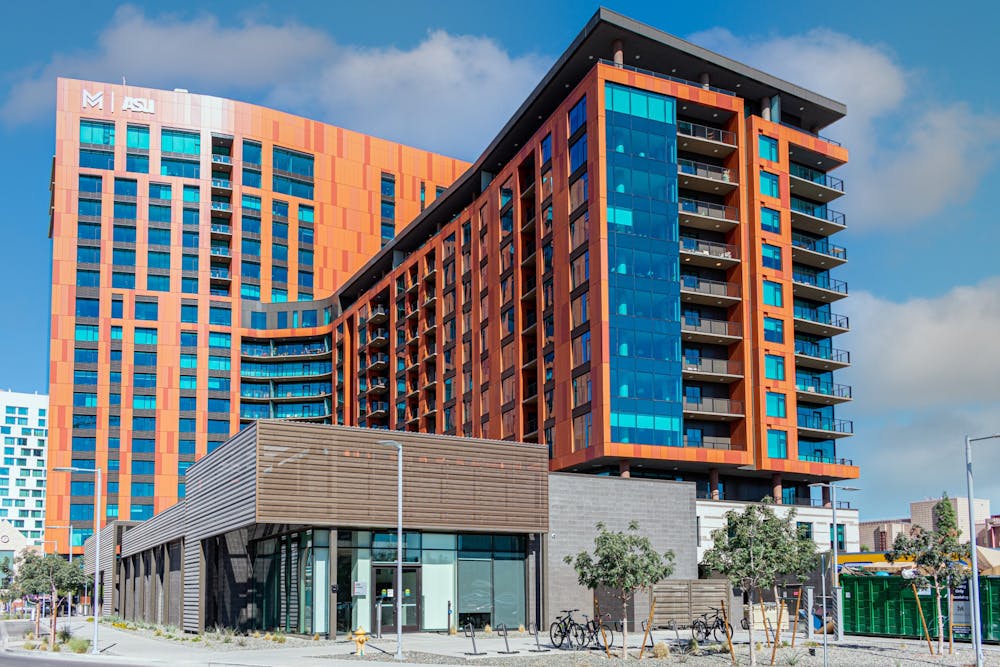Nearly a year ago, Mirabella at ASU opened near the Tempe campus as a retirement community meant to encourage lifelong learning by allowing the elderly residents to take classes at ASU. From the beginning, many saw the placement of Mirabella on University Drive, not far from Mill Avenue, as an odd choice given Tempe's reputation as a rowdy college town, known for its bars, clubs and live music performances.
The reality of that odd choice came as COVID-19 restrictions eased when Shady Park, a live music venue across the street from Mirabella, began inviting musicians and DJs back to perform, which the venue has been known for since its opening.
Mirabella quickly launched a series of complaints at the music venue ... for playing music. This conflict went from absurd to deplorable when Mirabella filed a lawsuit against Shady Park, putting the small business in financial jeopardy.
READ MORE: Mirabella retirement home, residents sue Shady Park over loud music
Mirabella should be an asset to help educate the community, but instead, they are threatening small businesses.
The situation reflects a bigger issue of ASU's hunger for money at the expense of local businesses and its students. As students on campus struggle financially and are made to live in subpar housing conditions, the University continues to expand outward, sometimes in areas where it is not wanted.
ASU has a plethora of issues that should be getting undivided attention by the University, such as lackluster housing. However, ASU continues to put millions of dollars into projects that leave the rest of us scratching our heads. Issues that matter to students, on the other hand, are being addressed at a stagnant pace.
It's a slap in the face to students who are struggling to find affordable housing as ASU builds a 20-story high-rise building that can be seen from across Tempe.
Now, not only ASU students but local businesses along Mill Avenue are being impacted by the University's lack of foresight.
"When you get the advantages, you get the disadvantages of city life," said Christopher Clark, a clinical associate professor who teaches business law courses. "And to say that it has to be quiet in a city strikes me as a somewhat extreme position."
In a statement provided to media outlets, Edward Kavazanjian, a Mirabella resident and Regents professor at the School of Sustainable Engineering and the Built Environment, said living in Mirabella was noisier than living in Manhattan, New York. While I understand his desire for peace and quiet, I don't understand why he thought he would get that by living near ASU.
Kavazanjian has been teaching at ASU since 2004. Shouldn't he be familiar with the fact that downtown Tempe is noisy on the weekends?
This situation displays both a lapse in judgment on the part of those choosing to live in Mirabella and Mirabella itself for fighting with the exact environment that they advertised. Mirabella calls its environment an "urban oasis," then proceeds to cause an uproar over said urban environment.
The idea of a university providing services for elderly people is nothing new. The Osher Lifelong Learning Institute at ASU began to provide low-cost classes for people over the age of 50 in 1999. In fact, there are systems in place in all 50 states for older adults to take low-cost college courses.
The difference is that these other systems generally don't encourage their older adult population to live in a dedicated building on the noisiest corner of campus and proceed to complain about it. I'm all for intergenerational mingling, but not if this mingling involves harassing small businesses that were there before you and intimidating them into changing their entire business model.
At this point, it's clear that Mirabella is not going anywhere. My hope is that those leading Mirabella can become positive members of the community, working with the businesses around them, rather than bullying them into compliance.
Reach the columnist at htenore@asu.edu or follow @haleyyhmt on Twitter.
Editor's note: The opinions presented in this column are the author's and do not imply any endorsement from The State Press or its editors.
Want to join the conversation? Send an email to opiniondesk.statepress@gmail.com. Keep letters under 500 words and be sure to include your university affiliation. Anonymity will not be granted.
Like The State Press on Facebook and follow @statepress on Twitter.
Continue supporting student journalism and donate to The State Press today.

Haley Tenore is the editor of the State Press Opinion Desk. Tenore is also a digital reporter for Cronkite News and a co-president of the Accessibility Coalition. This is her fourth semester on the opinion desk and second semester as editor.




